With Republicans leading Democrats 12 to 2 in the bottom of the sixth inning (of a seven-inning contest) in their annual charity Congressional Baseball Game last week, Sen. Joni Ernst entered the game as a pinch-runner at second base.
Ernst, R-Iowa, scored the Republicans’ 13th run as they went on to win the game, played at Washington Nationals Park, for the fifth year in a row.
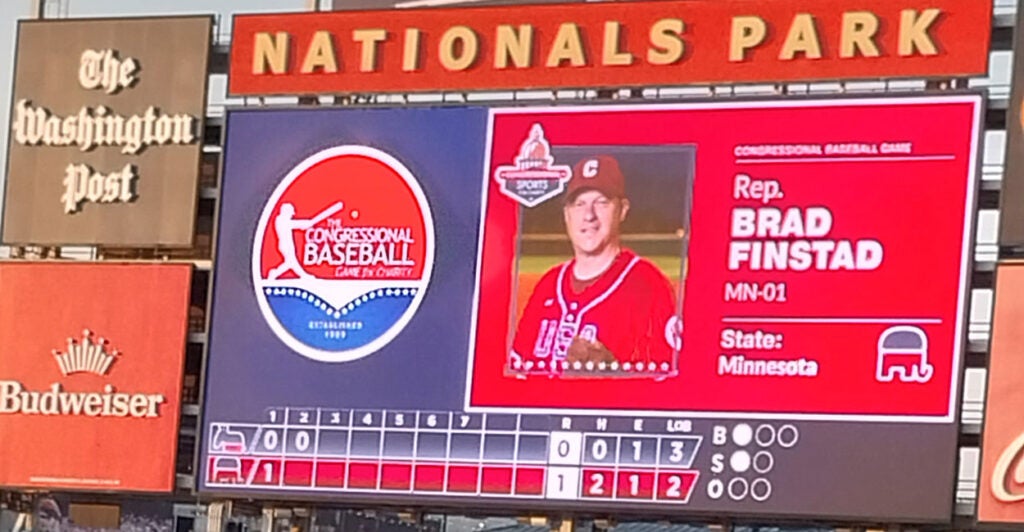 (Peter Parisi/The Daily Signal)
(Peter Parisi/The Daily Signal)The final score of the June 11 game was 13 to 2.
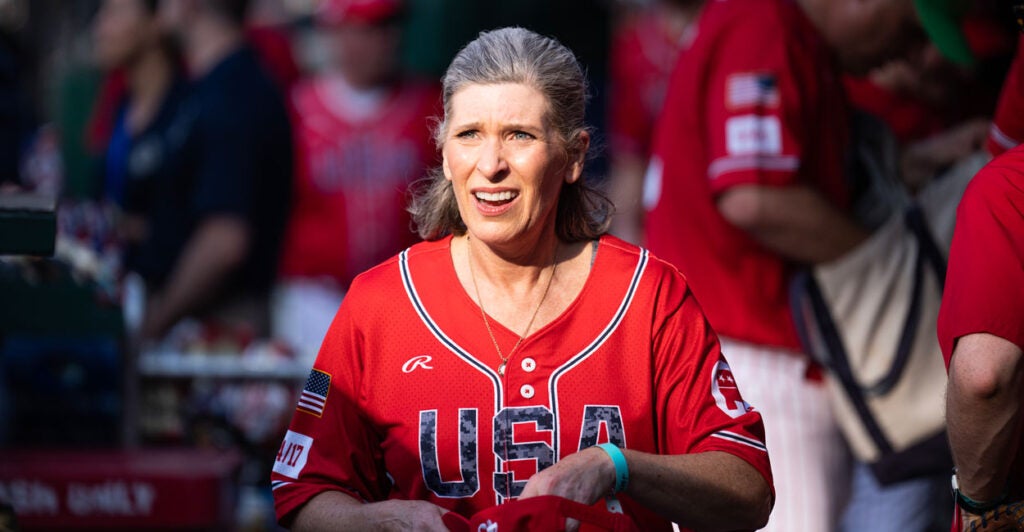
Sen. Joni Ernst, R-Iowa, was a pinch runner for the GOP in the annual Congressional Baseball Game at Washington Nationals Park on June 11. (Tom Williams/CQ-Roll Call via Getty Images)
Given the partisan bragging rights that go with winning the annual event, had the score been closer—say, 3 to 2, rather than 12 to 2—at the time, it’s unlikely that Ernst, the only female member of Congress to actually play in the game, would have gotten the cameo appearance. (Ernst was one of five women on the GOP roster; Democrats had two.)
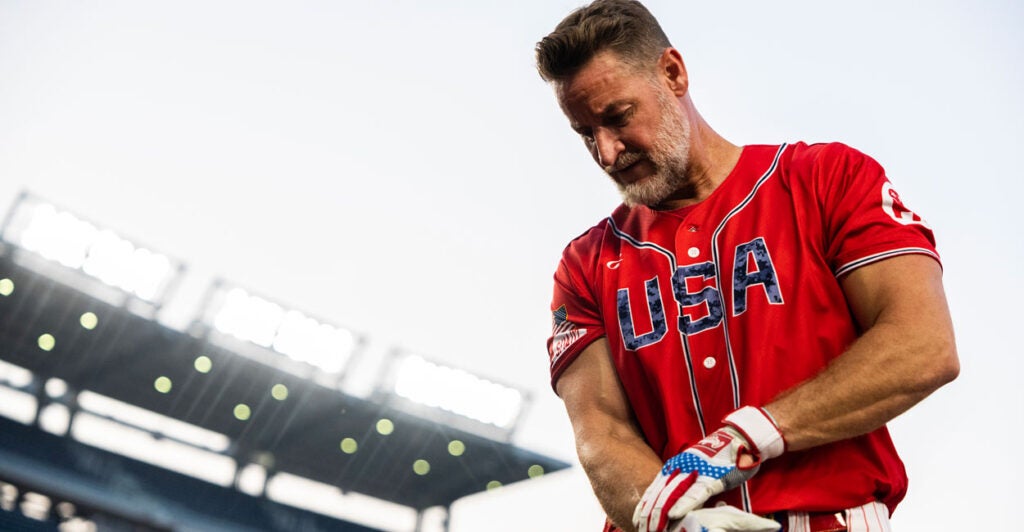
Rep. Greg Steube, R-Fla., goes to bat during the Congressional Baseball Game on June 11. (Tom Williams/CQ-Roll Call via Getty Images)
That doesn’t reflect negatively in any way on Ernst’s athletic skills or lack thereof, since I have no idea whether the Iowa senator plays any sports, either competitively or just for fun or exercise.
It’s just a roundabout way of saying what should be obvious, but for some reason isn’t—at least not to today’s Democrat deniers of chromosome science: Men’s sports are for males, and women’s sports are—or should be—reserved for females.

Reps. Blake Moore, R-Utah, and Lisa McClain, R-Mich., are seen here during the Congressional Baseball Game at Nationals Park on June 11. (Tom Williams/CQ-Roll Call via Getty Images)
That said, it’s worth noting that congressional Democrats didn’t put transgender freshman Rep. Sarah (née Tim) McBride of Delaware on the field Wednesday night, if only to underscore their obdurate opposition to federal legislation protecting women’s sports from transgender faux female interlopers.
All of this came just days after Major League Baseball’s May 29 announcement that it would invest in, and otherwise support, the women’s fledgling Athletes Unlimited Softball League, in a manner akin to the relationship between the NBA and the WNBA.
MLB and the women’s softball league jointly announced that they would “work collaboratively to help raise the visibility of the AUSL and its athletes … across MLB’s marketing, events, distribution, editorial, digital and social platforms, content and more, including select AUSL games airing on MLB Network and MLB.com.”
Additionally, MLB’s initial financial investment of $10 million “will assist with league operational costs and key growth initiatives.”
In its inaugural season, there are only four teams—the Volts, the Talons, the Bandits, and the Blaze—in the fledgling league, whose opening day was June 7 with games in Rosemont, Ill., and Wichita, Kan.
Rather than the teams having fixed home bases in its first season, the league is operating a traveling format. The four teams will play 24 games each, visiting 12 cities. The two teams with the best won-lost record at the end of the season are set to compete in a best-of-three league championship series July 26 to 28 in Tuscaloosa, Ala.
Now, the AUSL just needs a ferocious competitor with the star power of the WNBA Indiana Fever’s Caitlin Clark to capture the public’s imagination.
With just four teams, presumably only the best female softball players in the country qualify for their rosters.
“This is a watershed moment for women’s sports and especially for softball,” AUSL Commissioner Kim Ng said in a statement. “MLB’s investment will supercharge our efforts to build the sustainable professional league this sport has long deserved and sends a powerful message about the value of female athletes and the importance of creating professional opportunities for them.”
That’s all the more reason it would be a travesty if any of the AUSL teams were to even consider recruiting the likes of transgender high schooler Marissa (née Charlie) Rothenberger, who powered Champlin Park High School to its first-ever Minnesota State High School League championship earlier this month.
The New York Post reported that rival teams cried foul after Rothenberger “pitched five games in a row—including all three in the Class 4A tournament,” giving up just one run in 35 innings.
To send an unmistakable preemptive shot across the bow of—or in baseball parlance, a fastball across the letters of—any such faux females who would attempt to win a spot-on one of its teams’ rosters, Athletes United perhaps should consider changing its curiously ambiguous name to something more like the Real Women’s Softball League.
It would be what Betsy Jochum—the last remaining member of the All-American Girls Professional Baseball League, who died May 31 at the age of 104—surely would have wanted. (The AAGPBL, which operated from 1943 to 1954, was the inspiration for the 1992 film “A League of Their Own.”
At the same time, however, I would challenge congressional Democrats who insist that McBride is a woman—his XY chromosomes notwithstanding—to put him in their lineup at next year’s Congressional Baseball Game. After all, they couldn’t do any worse than they did this year.

Rep. Randy Feenstra, R-Iowa, carries the trophy after Republicans won the annual Congressional Baseball Game at Nationals Park in Washington on June 11. (Kayla Bartkowski/Getty Images)
>>>Relive the 2025 game here: https://www.c-span.org/program/public-affairs-event/2025-congressional-baseball-game/660812
The post Playing Congressional Hardball to Protect Women’s and Girls Sports appeared first on The Daily Signal.
.png)









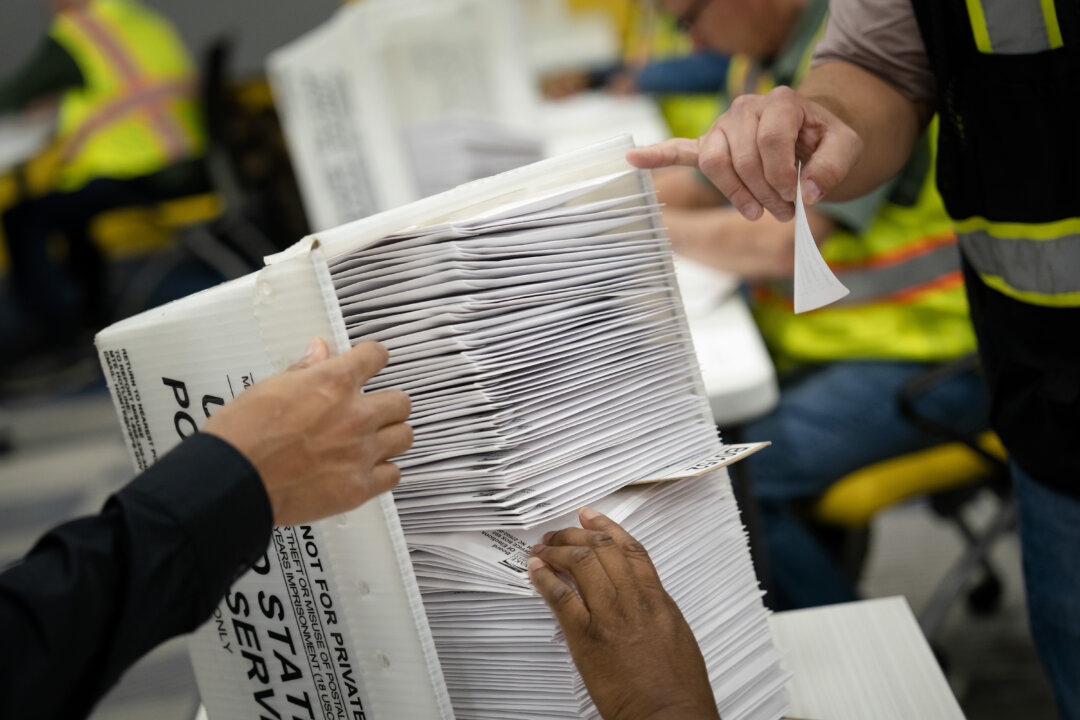




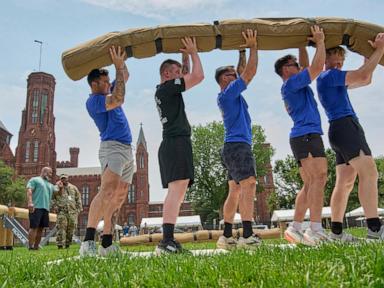
 English (US)
English (US)